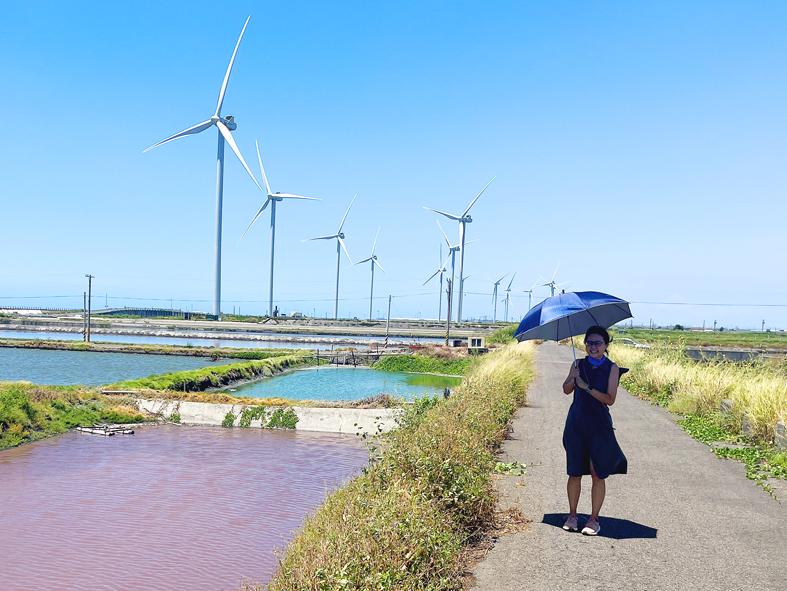The Ministry of Economic Affairs on Friday said it expects the nation to obtain 15.1 percent of its electricity from renewable sources by 2025, falling short of a 20 percent target set by President Tsai Ing-wen (蔡英文) in 2016.
The Taiwan Energy Statistics Year Book report, published on Friday by the Bureau of Energy, said that the share of renewables in the nation’s electricity mix had increased to 6 percent by the end of last year and is expected to reach 8 percent by the end of this year.
After taking office in 2016 — when renewables accounted for 4.1 percent of Taiwan’s electricity mix — Tsai laid out plans to obtain 20 percent of the nation’s electricity from renewables by 2025, with 50 percent coming from natural gas and 30 percent from coal.

Photo: CNA
The plan was part of a campaign promise to phase out the country’s three remaining nuclear power plants, which provided about 9.6 percent of Taiwan’s electricity last year.
The report blamed the target shortfall on increasing demand for electricity.
Electricity consumption last year rose 4.5 percent from a year earlier, driven by increased production in the manufacturing sector after the global economy rebounded from the COVID-19 pandemic, the report said.
Meanwhile, integrating renewable energy sources into the grid in a way that allows them to operate at full capacity remains a challenge, with grid connections for renewable sources not expected to be completed until the end of 2025, it said.
The government is now hoping to realize Tsai’s 20 percent target by October 2026, it added.
By utilizing power generation from offshore wind farms, solar projects and biofuel energy, the government aims to increase the share of renewables to 21 percent in 2027 and 23 percent in 2028, the report said.
As of the end of last year, the nation’s total solar installation only reached 7.7 gigawatt (GW), missing the government’s target of 8.75GW, energy bureau data showed.
It was the third consecutive year Taiwan failed to meet its solar installation goal.
The 2020 target was 6.5GW, but only 5.82GW was operational at the end of that year, the data showed.
To achieve the government’s 2025 target of 20GW from solar installations, it must annually add a capacity of 3GW from this year.
However, the nation’s newly added capacity was 680 megawatt in the first five months of the year, reaching only 22.7 percent of the year’s target, with accumulated installation of 8.38GW far below the government’s expectations.
Companies in the solar industry attributed the slower-than-expected adoption to soaring raw material prices, logistics bottlenecks caused by COVID-19 lockdowns in China, worldwide port congestion and surging freight rates.
The bureau said it had launched several measures to encourage solar installation, including on June 28, announcing it would maintain its solar feed-in tariffs for the second half of the year, citing rising installation costs.
It also started requiring rooftop solar system installation on suitable buildings, regardless of whether they are newly built, extensions or reconstructions, it added.
Additional reporting by Chen Cheng-hui

South Korea’s equity benchmark yesterday crossed a new milestone just a month after surpassing the once-unthinkable 5,000 mark as surging global memory demand powers the country’s biggest chipmakers. The KOSPI advanced as much as 2.6 percent to a record 6,123, with Samsung Electronics Co and SK Hynix Inc each gaining more than 2 percent. With the benchmark now up 45 percent this year, South Korea’s stock market capitalization has also moved past France’s, following last month’s overtaking of Germany’s. Long overlooked by foreign funds, despite being undervalued, South Korean stocks have now emerged as clear winners in the global market. The so-called “artificial intelligence

NEW IDENTITY: Known for its software, India has expanded into hardware, with its semiconductor industry growing from US$38bn in 2023 to US$45bn to US$50bn India on Saturday inaugurated its first semiconductor assembly and test facility, a milestone in the government’s push to reduce dependence on foreign chipmakers and stake a claim in a sector dominated by China. Indian Prime Minister Narendra Modi opened US firm Micron Technology Inc’s semiconductor assembly, test and packaging unit in his home state of Gujarat, hailing the “dawn of a new era” for India’s technology ambitions. “When young Indians look back in the future, they will see this decade as the turning point in our tech future,” Modi told the event, which was broadcast on his YouTube channel. The plant would convert

‘SEISMIC SHIFT’: The researcher forecast there would be about 1.1 billion mobile shipments this year, down from 1.26 billion the prior year and erasing years of gains The global smartphone market is expected to contract 12.9 percent this year due to the unprecedented memorychip shortage, marking “a crisis like no other,” researcher International Data Corp (IDC) said. The new forecast, a dramatic revision down from earlier estimates, gives the latest accounting of the ongoing memory crunch that is affecting every corner of the electronics industry. The demand for advanced memory to power artificial intelligence (AI) tasks has drained global supply until well into next year and jeopardizes the business model of many smartphone makers. IDC forecast about 1.1 billion mobile shipments this year, down from 1.26 billion the prior

People stand in a Pokemon store in Tokyo on Thursday. One of the world highest-grossing franchises is celebrated its 30th anniversary yesterday.